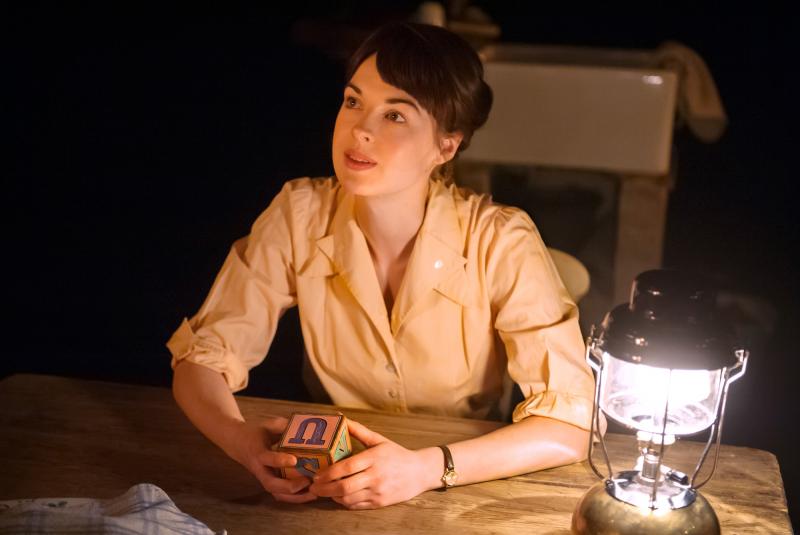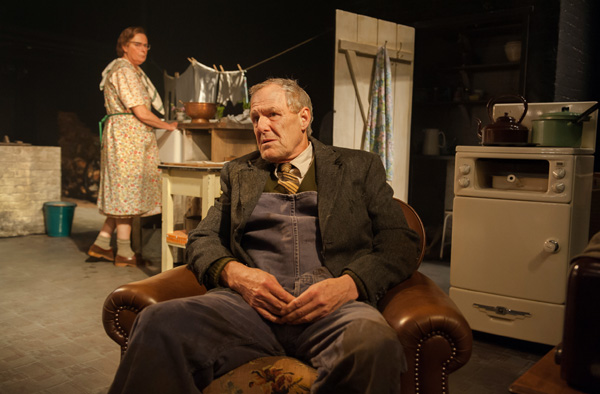Roots, Donmar Warehouse | reviews, news & interviews
Roots, Donmar Warehouse
Roots, Donmar Warehouse
Arnold Wesker’s 1959 classic about love and politics gets a very moving revival

British theatre is obsessed with the new, with novelty. And one of the obvious casualties of this is old plays that are not by Ibsen or Chekhov. Plays that feature in every history of British theatre, such as Arnold Wesker’s 1959 classic, Roots, about the political and sentimental education of Beatie Bryant, with its uplifting final scene of her self-awakening. At last, this revival gives us all the chance to watch a legendary piece of our cultural history.
The second in Wesker’s trilogy about 20th-century society, this version of Roots follows nicely on from the Royal Court’s revival of the first episode, Chicken Soup with Barley, in 2011. In that play, we saw how Ronnie Kahn, the son of a Communist-Jewish East End family, had become disillusioned, and how his mother urged him to discover his capacity to care and to love. Now, in Roots, he is the offstage boyfriend of Beatie, the daughter of a family of Norfolk farm labourers.
The generational struggles and the class conflict remain relevant
She has been to London, and fallen for Ronnie. Now back in rural Norfolk, she tells her family that she has invited him to come to stay. But she is painfully conscious that her newfound metropolitan friend wouldn’t be very impressed by the humble folk who inhabit her home environment. Her father and mother are taciturn hard-working folk, and her sister and brother likewise.
Written in Norfolk dialect, and taking the form of a classic well-made play in the kitchen-sink style, Roots is a family reunion story that stages an exciting range of ideas. It is about labour disputes and trade union representation, about the influence of pop songs and mass culture, about sexual mores (Beatie shocks her sister by telling her about afternoon sex sessions). It is about language and about self-discovery, but also about the sadness of old people dying.
Like Arthur Miller, Wesker writes great parts for women, and he often gives them the last word. He shows how women’s work is never done and how mother and daughter, and the two sisters, are constantly active — it’s the men who sit on their arses. A strong theme is Beatie’s resentment against her parents, and her final conflict with her mother is sharply realised and psychologically convincing.
 The evening opens with the smell of cooked liver, mashed spuds and fresh bread, and domestic routines dominate the action: dishes are cooked, sponges are made, dishes are washed up, the floor is swept and a tin bath is filled. But while showing all this activity was once radical, it now seems a bit tiresome. What remains highly relevant are the generational struggles and the class conflict.
The evening opens with the smell of cooked liver, mashed spuds and fresh bread, and domestic routines dominate the action: dishes are cooked, sponges are made, dishes are washed up, the floor is swept and a tin bath is filled. But while showing all this activity was once radical, it now seems a bit tiresome. What remains highly relevant are the generational struggles and the class conflict.
Although Beatie’s final speech is brilliantly written, it is not a straightforward radical call to arms. Despite her desire to discuss problems with her family, in the end she just browbeats them. Her final speech is one long monologue: it’s socialism in the form of a lecture rather than as cooperation. And, in her self-awakening, Beatie looks forward to the subjective Sixties rather than back at the communist Thirties. Finally, Beatie’s main concern is Beatie.
James Macdonald’s sterling production is both humorous and moving. On Hildegard Bechtler’s meticulous set, where you can sniff the shoe polish and blink through the gloom, Macdonald’s cast deliver a splendid mix of character study and cameo. As Beatie, Jessica Raine is more persuasive as Ronnie’s ventriloquist dummy than as an abrasive daughter. But she blossoms at the end, and her final scene is brilliant. Linda Basset and Ian Gelder — bitter expressions deluxe (pictured above) — are convincing as her parents. A great play; a great evening.
rating
Explore topics
Share this article
The future of Arts Journalism
You can stop theartsdesk.com closing!
We urgently need financing to survive. Our fundraising drive has thus far raised £49,000 but we need to reach £100,000 or we will be forced to close. Please contribute here: https://gofund.me/c3f6033d
And if you can forward this information to anyone who might assist, we’d be grateful.

Subscribe to theartsdesk.com
Thank you for continuing to read our work on theartsdesk.com. For unlimited access to every article in its entirety, including our archive of more than 15,000 pieces, we're asking for £5 per month or £40 per year. We feel it's a very good deal, and hope you do too.
To take a subscription now simply click here.
And if you're looking for that extra gift for a friend or family member, why not treat them to a theartsdesk.com gift subscription?
more Theatre
 Little Brother, Soho Theatre review - light, bright but emotionally true
This Verity Bargate Award-winning dramedy is entertaining as well as thought provoking
Little Brother, Soho Theatre review - light, bright but emotionally true
This Verity Bargate Award-winning dramedy is entertaining as well as thought provoking
 The Unbelievers, Royal Court Theatre - grimly compelling, powerfully performed
Nick Payne's new play is amongst his best
The Unbelievers, Royal Court Theatre - grimly compelling, powerfully performed
Nick Payne's new play is amongst his best
 The Maids, Donmar Warehouse review - vibrant cast lost in a spectacular-looking fever dream
Kip Williams revises Genet, with little gained in the update except eye-popping visuals
The Maids, Donmar Warehouse review - vibrant cast lost in a spectacular-looking fever dream
Kip Williams revises Genet, with little gained in the update except eye-popping visuals
 Ragdoll, Jermyn Street Theatre review - compelling and emotionally truthful
Katherine Moar returns with a Patty Hearst-inspired follow up to her debut hit 'Farm Hall'
Ragdoll, Jermyn Street Theatre review - compelling and emotionally truthful
Katherine Moar returns with a Patty Hearst-inspired follow up to her debut hit 'Farm Hall'
 Troilus and Cressida, Globe Theatre review - a 'problem play' with added problems
Raucous and carnivalesque, but also ugly and incomprehensible
Troilus and Cressida, Globe Theatre review - a 'problem play' with added problems
Raucous and carnivalesque, but also ugly and incomprehensible
 Clarkston, Trafalgar Theatre review - two lads on a road to nowhere
Netflix star, Joe Locke, is the selling point of a production that needs one
Clarkston, Trafalgar Theatre review - two lads on a road to nowhere
Netflix star, Joe Locke, is the selling point of a production that needs one
 Ghost Stories, Peacock Theatre review - spirited staging but short on scares
Impressive spectacle saves an ageing show in an unsuitable venue
Ghost Stories, Peacock Theatre review - spirited staging but short on scares
Impressive spectacle saves an ageing show in an unsuitable venue
 Hamlet, National Theatre review - turning tragedy to comedy is no joke
Hiran Abeyeskera’s childlike prince falls flat in a mixed production
Hamlet, National Theatre review - turning tragedy to comedy is no joke
Hiran Abeyeskera’s childlike prince falls flat in a mixed production
 Rohtko, Barbican review - postmodern meditation on fake and authentic art is less than the sum of its parts
Łukasz Twarkowski's production dazzles without illuminating
Rohtko, Barbican review - postmodern meditation on fake and authentic art is less than the sum of its parts
Łukasz Twarkowski's production dazzles without illuminating
 Lee, Park Theatre review - Lee Krasner looks back on her life as an artist
Informative and interesting, the play's format limits its potential
Lee, Park Theatre review - Lee Krasner looks back on her life as an artist
Informative and interesting, the play's format limits its potential
 Measure for Measure, RSC, Stratford review - 'problem play' has no problem with relevance
Shakespeare, in this adaptation, is at his most perceptive
Measure for Measure, RSC, Stratford review - 'problem play' has no problem with relevance
Shakespeare, in this adaptation, is at his most perceptive
 The Importance of Being Earnest, Noël Coward Theatre review - dazzling and delightful queer fest
West End transfer of National Theatre hit stars Stephen Fry and Olly Alexander
The Importance of Being Earnest, Noël Coward Theatre review - dazzling and delightful queer fest
West End transfer of National Theatre hit stars Stephen Fry and Olly Alexander

Add comment